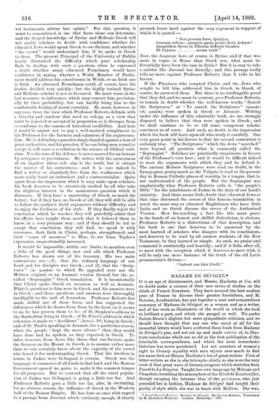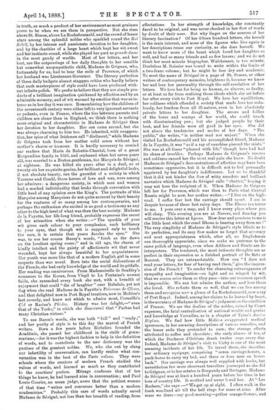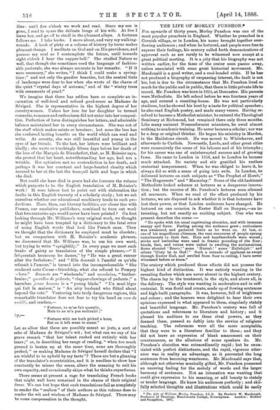MADAME DE SEVIGN1. 11 IT is an age of disinterment, and
Messrs. Hachette et Cie. will no doubt make a success of their new series of studies on the chiefs of French literature. They have secured the best modern pens of France to discuss their greater forefathers, and M. Boissier, Academician, has put together a neat and compendious summary of Madame de Sevigne as a woman and as a writer, and of her work as illustrative of the world in which she took so brilliant a part, and which she ganged so welL We prefer Sainte-Beuve's slighter but more sympathetic criticism, and we should have thought that any one who cared at all for the immortal letters would have preferred them fresh from Madame de SevignO*8 pen, and not cut up and made entries of, to illus- trate conclusions which are as old as the first publication of the inimitable correspondence, and which the most iconoclastic historian has never questioned. Let not asserters of woman's right to literary equality with men rejoice over-much to find her name first on Messrs. Hachette's list of great writers. First of letter-writers as she is, she triumphs chiefly as she is on the very crest of that great wave of literary progress which stretches from Pascal to La Brayer°. Taught her own language by Menage and Chapelain, breathing the atmosphere of the Hotel de Rambonillet, though escaping the intenser blue of the precieuses, who just preceded her in fashion, Madame de Bevigne had caught their purity of style while she was in heart with Moliere. She was, • Great French Writers: Madame de &riga. By Ga ton Boissier. Translated by H. Llewellyn Williams. London : Rontledge. 1387.
in truth, as much a product of her environment as most geniuses prove to be when we see them in perspective. But she rises above St. Simon, above La Rochefoncauld, and the crowd of lesser stars among the splendid nobles who sparkled round the Roi• Soleil, by her intense and passionate devotion to her daughter, and by the charities of a large heart which kept her wit sweet and her instincts sound, while she played her part as grande dame in the most gaudy of worlds. Most of her letters, and her best, are the outpourings of her daily thoughts to her sensible but somewhat unsympathetic child, Madame de Grignan, who, fortunately for us, had to bear the exile of Provence, of which her husband was Lieutenant-Governor. The literary perfection of these daily budgets almost staggers critics who hardly believe that such masterpieces of style could have been produced with- out infinite polish. We prefer to believe that they are simple pro- ducts of a brilliant imagination quickened by affection and by an admirable memory, and of wit warmed by emotion that was as in- tense as in her day it was rare. Remembering how the children of the seventeenth century were either left to very ignorant servants or pedants, even in France, where the ties between parents and children are closer than in England, we think there is nothing more original and characteristic in Madame de Sevigne than her devotion to her daughter. Her son came second, but she was always charming to him too. He inherited, with exaggera- tion, her spice of what Irishmen call " divilment," while Madame de Grignan took from her mother solid sense without her mother's charm or humour. It is hardly necessary to remind our readers that Marie de Rabutin-Chantal, born of a great Burgundian family in 1626, and orphaned when but seven years old, was married to a Breton gentleman, the Marquis de &vigil& at eighteen. He was killed six years after in a duel, so at twenty-six her exquisite genius, her brilliant and delightful looks, if not absolute beauty, ran the gauntlet of a society in which Turenne and Conde, those heroes of love and war, were among her admirers : a dangerous society, in which men and women had a marked individuality that broke through convention with little heed of any opinion save the King's. The portraits of this Marquise among Marquises do not quite account by their beauty for the raptures of so many among her contemporaries, and perhaps the enthusiam she excited is as good a testimony as any other to the high level of what was then the best society. Madame de la Fayette, her life-long friend, probably expresses the secret of her attraction when she writes : —" The sparkle of your wit gives such colour to your complexion, such brilliancy to your eyes, that though wit is supposed only to touch the ears, it is certain that yours dazzles the eyes." She was, to use her cousin Bussy's words, " fresh as the dawn on the loveliest spring roses ;" and in old age, the charm of kindly intellect and the gaiety of affectionate wit that never wounded, kept her always beautiful to her acquaintances Her youth was more like that of a modern English girl in some respects than was usual. Born into the social dislocations of the Fronde, she had early knowledge of the world and its pitfalls. Her reading was omnivorous. From Mademoiselle de Scudery's romances to the Koran, from Virgil to La Fontaine's newest fable, she ransacked every book she met, with a breadth of enjoyment that could "die of laughter" over Rabelais, yet not flag when she read Madame de la Fayette's Princesse de Cleves, and that delighted now in Port Royal treatises, now in Moliere's last comedy, and knew not which to admire most, Corneille's Cid or Racine's Phedre. History was her delight,—" even that of the Turks," in which she discovered that "Pashas had many Christian virtues."
To use Bacon's words, she was both "full " and " ready ;" and her purity of style is to this day the marvel of French writers. Born a few years before Richelieu founded the Academie, she passed her childhood in the strife of gram- marians,—for it was the highest fashion to help in the definition of words, and to contribute to the new dictionary was the pastime of the greatest nobles. We, who eke out by slang our infertility of conversation, can hardly realise what con- versation was in the best of the Paris salons. They were schools where the creators of modern French studied the values of words, and learned as much as they contributed to the courtiers' purism. Menage confesses that of ten things he knew, he had learned nine in conversation ; and Paul Louis Courier, no mean judge, avers that the pettiest woman of that time " writes and converses better than a modern academician." Probably this care of words actually saved Madame de Sevigne, not less than her breadth of reading, from
affectations. In her strength of knowledge, she constantly dared to be original, and was never checked in her flow of words by doubt of their uses. But why linger on the sources of her literary fascination ? Of her fifteen hundred letters, she herself is the main interest, and none of the figures who live again in her descriptions rouse our cariosity, as she does herself. We want to know more of the heart which loved her daughter so well, and had so many friends and so few lovers; and we do not think her most minute biographer, Walckenaer, is too minute. Doubtless M. Boissier was bound to write within the limits of a two-franc volume ; but he might be less dry and academic. To meet the name of Sevigne in a page of St. Simon, or other writers of contemporary memoirs, brightens it, because we know her and love her personality through the self-revelation of her letters. We love her for being so human, so sincere, so faulty, or at least so far from realising those ideals which she set before her after every visit to Port Royal. We love her equilibrium, her coldness which offended a society that made love too sedu- lously, her freedom from all ill-nature, even in her absolutely private letters to her daughter. The errors and follies of the bores and scamps of her world, she could touch with discriminating pen ; but she judged people by their best, and her friends were all good in her eyes. She did not abuse the tendencies and moles of her days. " The public," she writes, "is neither mad nor unjust." When she visited La Rochefoncauld and his accomplished friend, Madame de la Fayette, it was "as if a ray of sunshine pierced the mists." She was at all times " pleased with life," though hers had had its share of troubles. Perhaps Madame de Grignan's reserve and coldness caused her the most real pain she knew. No doubt Madame de Sevigne's demonstrations of affection may have been sometimes oppressive, but it is difficult not to feel personally aggrieved by her daughter's indifference. Let us be thankful that it did not hinder the flow of witty anecdote and brilliant narrative which Madame de Sevigne calls " chatter," hoping it may not bore the recipient of it. When Madame de Grignan left her for Provence, which was then to Paris what Central Russia might be now, her mother writes : —" I live on the high- road. I suffer fear lest the carriage should upset. I am in despair because of these last rainy days. The Rhone is a terror to me. I pore over a map, and I know every place where you will sleep. This evening you are at Nevers, and Sunday you will receive this letter at Lyons. How dear and precious to me is the little boat which the cruel Rhone is bearing away from me !" The very simplicity of Madame de Sevigne's style blinds us to its perfection, and its easy flow makes us forget that accuracy and neat appropriateness which, after all, no Englishman can thoroughly appreciate, since we make no pretence to the same polish of language, even when Addison and Steele are its interpreters. The tenderest, the most intimate thoughts are as perfect in their expression as a finished portrait of De Retz or Bossuet. They are untranslatable. How can " I dare not read your letters, for fear of having read them," give the impres- sion of the French ? To render the charming extravagances of sympathy and imagination—so light and so winged by wit, that we scarce seize them as they pass—into our common speech is impossible. We can but admire the author, and love those she loved. She reflects them so well, that we can live amoug them and recognise now a gleam of La Rochefoucauld, now a ray of Port Royal. Indeed, among her claims to be learned by heart, is the accuracy of Madame de Sevigne's judgment on the condition of France. We see the decline of the nobles, ruined by Court expenses, the fatal centralisation of national wealth and genius and knowledge at Versailles, as in a chapter of Taine's Ancien Regime. We find how little Moliere exaggerated medical ignorance, in her amusing descriptions of various remedies, and the lesser evils they pretended to cure; the strange effects attributed to coffee and chocolate ; the early abuses of tea, of which the Duchesse d'Orleans drank twelve cups every day. Indeed, Madame de Sevigne's visit to Vichy is one of the most amusing incidents of her life. To travel there, she describes her ordinary equipage, comprising "seven carriage-horses, a pack-horse to carry my bed, and three or four men on horse- back." Her carriage was always well supplied with books, but nevertheless few more observant travellers journeyed as she did to Grignan, or to her estates in Burgundy and Bretagne. Madame de Sevigne was at least a hundred years before her time in her love of country life. It soothed and never bared her. At "Les Rochera," she says :—"We get up at eight. I often walk in the fresh woodland air till the bell rings for mass at nine. After mass we dress—say good-morning—gather orange-flowers, and
dine : until five o'clock we work and read. Since my son is gone, I read to spare the delicate lungs of his wife. At five I leave her, and go off to stroll in the pleasant alleys. A footman follows me. I take books. I move about, and vary my walking- rounds. A book of piety or a volume of history by turns makes pleasant change. I meditate on God and on His providence, and possess my soul as I contemplate the future, until towards eight o'clock I hear the supper-bell." She studied Nature so well, that though she sometimes used the language of fashion- able pastorals, she was always accurate in her remarks. "If it were necessary," she writes, "I think I could make a spring- time ;" and not only the gaudier beauties, but the neutral tints of landscape were dear to her when she wrote of the charm of the quiet "crystal days of autumn," and of the "wintry trees with ornaments of pearl."
We imagine that there has seldom been so complete an in- carnation of well-bred and refined good-sense as Madame de &vigil& She is representative in the highest degree of her countrywomen. Unless her love for her daughter be termed romantic, romance and enthusiasm did not enter into her composi- tion. Perfection of form distinguishes her letters, and admirable balance maintained her in every circumstance. She was not of the staff which makes saints or heroines ; but none the less has she conferred lasting benefits on the world which can read and write. At seventy, she was still beautiful and young in the eyes of her friends. To the last, her letters were brilliant and kindly ; she wrote so touchingly fifteen days before her death of the loss of the Marquis de Blanchefort, that, as M. Boissier says, she proved that her heart, notwithstanding her age, had not a wrinkle. Her optimism met no contradiction in her death, and perhaps it was her constant and large-hearted charity which secured to her at the last the tranquil faith and hope in which she died.
But could she have died in peace had she foreseen the volume which purports to be the English translation of M. Boissier's work ! It were labour lost to point out with elaboration the faults in this English travesty of a scholarly study ; but we ask ourselves whether our educational machinery tends to such pro- ductions. Have, then, our literary facilities, our closer ties with France, our emulative publishers, combined to turn out work that two centuries ago would never have been printed P On first looking through Mr. Williams's very original work, we thought he might have been tempted by a dictionary to the fatal error of using English words that look like French ones. Then we thought that the dictionary he employed must be obsolete ; but on comparison with M. Boissier's academic phrases, we discovered that Mr. Williams was, to use his own word,
but trying to write " In every page we meet such freaks of gaiety as translation of the simple phrases,—" Il frequentait beaucoup les dames," by "He was a great runner after the furbelows ;" and "Elie donnait a l'amitie ce qu'elle refusait ii l'amour," is turned into the incomprehensible " She rendered unto Cmsar=friendship, what she refused to Pompey —love." Savants are " wiseheads," and mondains, " feather- brains ;" querelles de pedants, " elapper-elawings of pedants ;" a harmless jeune homme is a " young blade." " Un marl ldger qui fait la maison," is " An airy husband who flitted about beyond the cote." Venturing into truly dangerous regions, this remarkable translator does not fear to try his hand on vers de societe, and renders,— "Fortune, to m'as fait querelle,
Mais to ne m'a pas maltraite ;" "Fortune with me bath picked a bone,
Bat on it left meat to atone."
Let us allow that these are possibly meant as jests, a sort of echo of Madame de Sevigne's wit ; but what can we say of his grave remark "that her talent rushed out entirely with her tears ;" or, in describing her range of reading, " when too much ground is beaten up at the same time, none are thoroughly probed; " or making Madame de Sevignd herself declare that "I am wishful to be upheld by my taste "P These are but a gleaning of the translator's eccentricities, and it is needless to show how constantly he misses the sense, alters the meaning to suit his own capacity, and occasionally skips what he thinks superfluous.
There seems at present a rage for translating French books that might well have remained in the shame of their original dress. We can but hope that such translations fail as completely to render the " realism " of their authors as this volume does to render the wit and wisdom of Madame de Sevigne. There may be some compensation in the thought. by,—




































 Previous page
Previous page